Algeria protests: how disinformation spread on social media
- Published
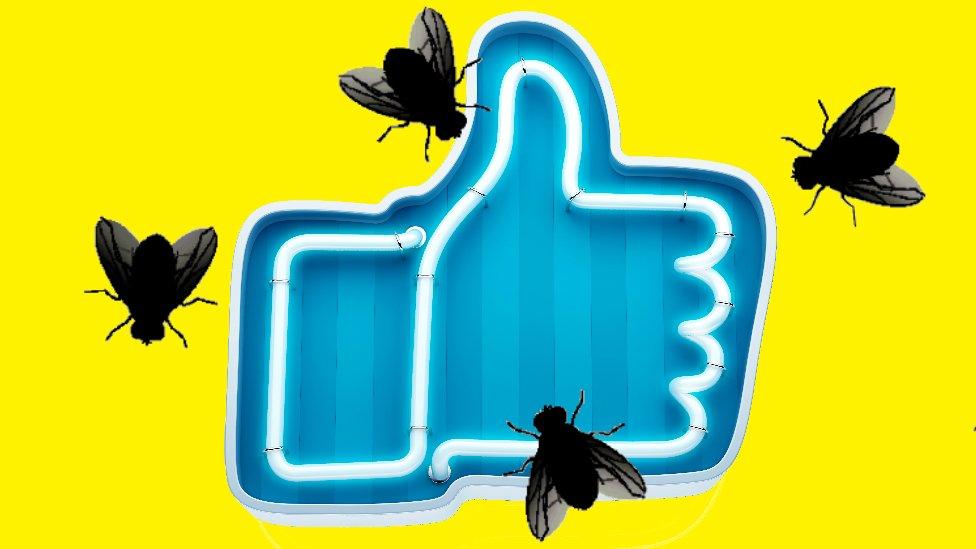
Amidst months of anti-government demonstrations, an online information battle is happening in Algeria. Protesters are trying to swat away annoying trolls - dubbed "electronic flies".
The interim president of the north African country recently announced that elections will take place in December, external.
It's the latest twist in a year of political drama which began in February and led to the resignation of the country's long-time president in April.
But protesters who want further reforms have continued taking to the streets - and the fight over the country's future has been particularly fractious on social media, which has been flooded with disinformation and fake news.

You may also be interested in:

What exactly is happening in Algeria?
On 22 February, thousands of Algerians protested against President Abdelaziz Bouteflika's decision to run for a fifth term in office. He had occupied the presidency since 1999.
The unrest caught the regime by surprise.
"We hadn't seen these kind of protests since the 1990s," said Dalia Ghanem, a resident scholar at the Carnegie Middle East Centre in Beirut.
Half of Algeria’s population is under the age of 30.
In an attempt to control the spread of information about the protests, access to the internet was disrupted in several parts of the country, according to NetBlocks, external, an organisation which monitors internet freedom.
Allow X content?
This article contains content provided by X. We ask for your permission before anything is loaded, as they may be using cookies and other technologies. You may want to read X’s cookie policy, external and privacy policy, external before accepting. To view this content choose ‘accept and continue’.
Under pressure, Mr Bouteflika eventually resigned in April, but that wasn't enough to quell the protesters' anger at "le pouvoir" - in English, "the powers that be" - the clique of generals, businessmen, and ruling party politicians that has for years surrounded the president.
"Then, a second phase of the cyber warfare started," says Raouf Farrah, one of the founders of the Collective of Activist Youth, one of the movements that have been involved in the protests. He contends that opponents of the protesters fought back "by engaging [internet] trolls, fake news, fake information, fake accounts."

Find out more about the Algerian protests:

What are 'electronic flies'?
The protesters use the term "electronic flies" to describe the troll-like accounts pumping out pro-government or pro-establishment messages.
Protest slogans have been written about them, external and their actions have been reported on by local media.
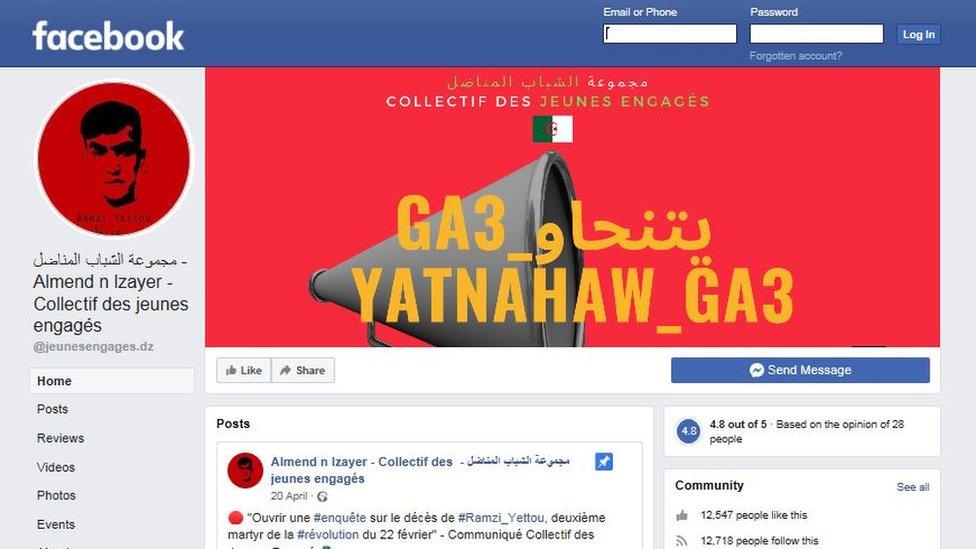
The Collective of Activist Youth says its Facebook page has targeted by trolls.
The Collective of Activist Youth's Facebook page has been one of their many targets. "You'll see trolls commenting negatively on our page and [calling] the movement... every possible name," says Mr Farrah.
He says the accounts used by these "electronic flies" often share a number of hallmarks of co-ordinated activity: they were created after the start of the protests, they have fewer than 100 friends, and they tend to repeat the same comments across a number of posts.
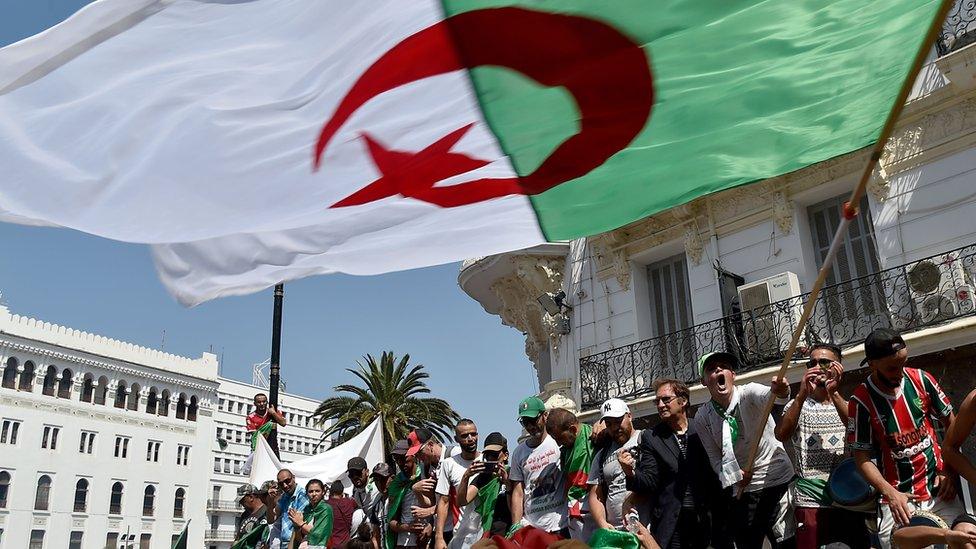
Anti-government protests have been held every Friday.
"They just create this annoying noise and they try to swerve the debate," says BBC Monitoring's Carolyn Lamboley, who's been analysing the "electronic flies". "It's just to create some sort of 'pollution'."
BBC Trending identified accounts that fit into this pattern of behaviour. But it is unclear whether the people running those accounts are acting on their own initiative or if they are part of an organised campaign.

Hear more on this story on the Trending podcast from the BBC World Service: Download now

What are the "electronic flies" buzzing about?
Comments and posts published by "electronic flies" seem to focus on a small number of topics, mostly aimed at undermining the protest movement.
One is the "conspiracy angle", says Ms Lamboley: "This idea that there's a foreign sponsorship behind the protests, that they might somehow be pushed or sponsored by outside powers." France, as Algeria's former colonial power, is often "an easy scapegoat," she says.
Many other comments posted by the "electronic flies" suggest that there is still broad popular support for Mr Bouteflika and the army.
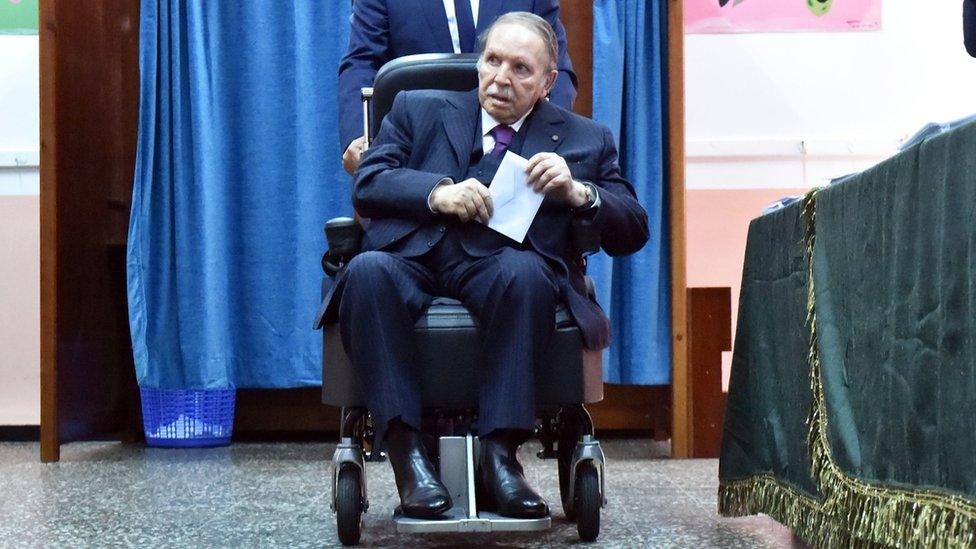
Former Algerian President Abdelaziz Bouteflika photographed in May 2017.
"Sometimes it's really weird stuff like 'Long live the army'," Ms Lamboley says. "And that phrase gets copied and pasted twelve times in one message, so it doesn't look like [normal] human behaviour."
Other messages play on tensions between Algeria's various ethnic groups.
What about fake news?
At the same time as the electronic flies emerged, a trove of fake news stories emerged online and quickly spread on social media.
"It became a site of struggle between the protesters and the authorities because a lot of Algerians basically get their information from Facebook," says Omar Al-Ghazzi, assistant professor in media and communication at the London School of Economics.
Amid this climate of political uncertainty, a Facebook page was created to debunk fake news about Algeria: Fake News DZ, external.
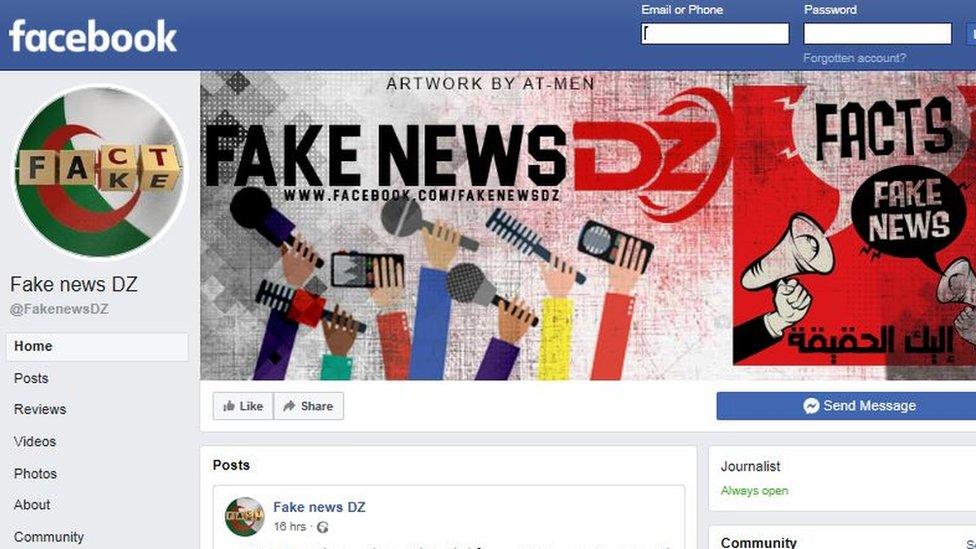
Fake News DZ is being followed by more than 70,000 people on Facebook.
"When the protests started, me and some friends of mine saw that there was an increase in published fake news," says Nassim, one of the creators of the page.
Nassim is an Algerian IT specialist based in Paris and, despite his lack of journalistic training, he says that debunking fake news in his spare time can be a fairly easy job - "as easy as doing a Google search."
A brief history of fake news
Since the page was created in April, Fake News DZ (".dz" is Algeria's top-level internet domain) says it has debunked more than 300 fake news stories. Many were anti-protest. Among them were reports that demonstrating was no longer necessary, and that Algeria was thriving after the president's departure.
Nassim says most of the political fake news comes from the anti-protest side or appears to be designed "to create some divisions among the protesters". However, other stories suggest that some protest supporters have also deployed disinformation tactics.
"During the summer, where the protests were less massive... we saw some people sharing pictures of the protests saying 'This is what happened today.' But they were old pictures, of old protests," Nassim told BBC Trending.
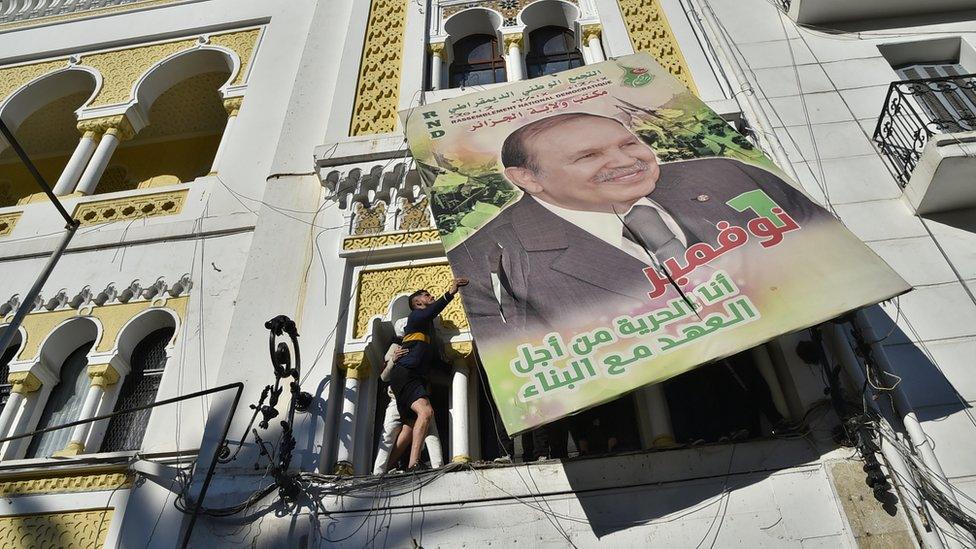
Protesters tear down a large billboard with a picture of former President Abdelaziz Bouteflika.
What do Algerians make of this?
A number of opposition politicians have condemned the use of fake news and electronic flies against the protest movement, suggesting the political establishment may be to blame for such tactics.
There's no firm evidence to suggest the government or the army are directly involved in any disinformation campaign. Neither the Algerian Embassy in the UK nor Algeria's Ministry of Communications replied to the BBC's requests for comment on this story.
Ruling party politicians have at times accused Algerian media outlets of engaging in "disinformation attempts" of their own. Algeria currently ranks 141 in the World Press Freedom Index, external, issued every year by the Reporters Without Borders group.
A fact-checker's guide to stopping fake news
A Facebook spokesperson told BBC Trending: "We don't want our platform to be used to manipulate people, and we work aggressively to combat the spread of disinformation."
The company pointed out that it removes pages and profiles that are being used in a coordinated way to spread disinformation. In one three-month period earlier this year, it took down 2.2 billion fake profiles.
Did you enjoy this piece? Listen to "Algeria's disinformation battle".
Blog by Marco Silva, external
Follow BBC Trending on Twitter @BBCtrending, external, and find us on Facebook, external. All our stories are at bbc.com/trending.